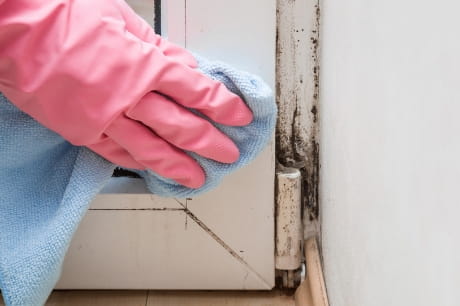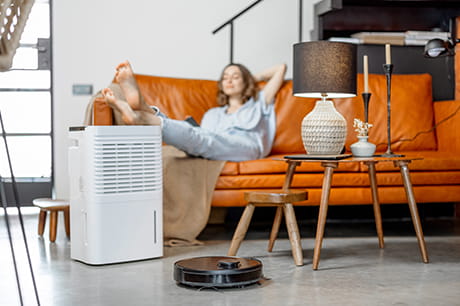Is mold making you sick?
Check on warm-weather trouble spots
Mold is one word that can send homeowners into a panic, especially as we wind down from a summer of record-high temperatures and humidity. But what really is the dreaded intruder, and could it be the blame for those unexpected summer illnesses?
“Molds are naturally-occurring fungal growths,” said Jonathan Spahr, M.D., director of pediatric pulmonary at Geisinger. “They can be found anywhere moisture and oxygen are present, but tend to seek out warmer climates or decaying matter to feed on to accelerate growth. This makes our homes a great target in the summer.”
Mold growth speeds up when it’s indoors. Mold’s tiny reproductive cells, called spores, are easily released into the air, and an enclosed space amplifies their ability to make contact with one another.
There are hundreds of species of mold. Some of those species are less dangerous, like penicillin, which has antibacterial properties and is used in antibiotic medication. But others could make you sick.
“Though small amounts of mold probably won’t hurt us, there is no species of mold that is ‘safe’ when inhaled. Those tiny spores could cause a host of health problems; mostly in people with respiratory problems, allergies or a compromised immune system” said Dr. Spahr.
Symptoms of mold exposure may include headache, sore throat, runny nose, coughing, sneezing, watery eyes and fatigue. In those with asthma, asthma attacks can occur. In those with impaired immune systems, serious infection can occur.
Here are the ways you can prevent the spread of mold, and what you can do to get rid of it.
- Keep an eye out for hidden leaks: Wet spots on your ceiling, at baseboards or on the floor are a telltale sign of a leaky pipe or roof. Your home’s pipes are behind drywall, which can leave a small leak unnoticed for a long time.
Mold can grow behind those walls and filter into the air through ducts or pipes. A plumber or contractor can help identify weak spots or possible leaks and prevent mold growth.
- Keep your air conditioner clean: Many air conditioners, especially window units, are susceptible to mold growth. They often trap moisture, creating a breeding ground for the spores. Choosing a unit with humidity control can prevent moisture build-up. Leaving the device running at a low or “automatic” level during the day will keep air circulating and prevent a serious rise in humidity. You should also replace filters every three months, or as recommended.
“Your home should always maintain less than 60 percent humidity in order to stop mold production,” said Dr. Spahr. Finally, keeping ducts free of dirt and dust also eliminates the organic matter on which mold can feed.
- Ventilate heat-prone rooms: Bathrooms, kitchens and laundry rooms create a lot of excess heat and humidity, whether it be from the shower, stove or dryer. All three of these rooms should be well ventilated to prevent the lingering moisture that attracts mold.
How to get rid of mold
Mold spores can lay dormant for years after they are produced and could begin growing at any time, leaving allergens active for long periods. Because of this, regular cleaning with agents that kill mold or professional mold remediation is always ideal.
Mold remediation begins by identifying the source of the moisture and making any necessary repairs, then removing all of the porous material in a room to be replaced with sanitized material. All non-porous surfaces need to be thoroughly cleaned with an anti-fungal detergent and thoroughly dried before porous materials like drywall or carpeting can be reinstalled.
Occupants can reenter the building after the infected spaces pass a visual or environmental test and there are no remaining signs of potential mold-causing water damage.












